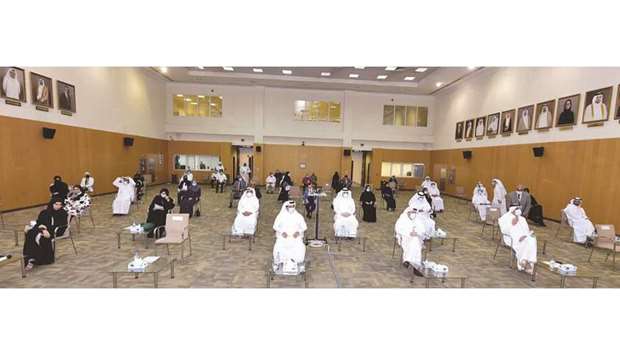Qatar University (QU) president, Dr Hassan bin Rashid al-Derham, has highlighted the university’s success in ensuring the progress of the educational process despite the ongoing Covid-19 crisis.
In a speech during the QU annual forum for the 2020 academic year, Dr al-Derham said QU has prepared a plan to deal with the pandemic.
He reviled that QU has approved a plan of not relying on traditional methods of teaching and has moved to the application of remote educational methods through various online platforms.
Dr al-Derham pointed out that the pandemic had not affected the university’s endeavour to raise its annual ranking as one of the best universities at the global and regional level, and it was ranked among the most important 350 international universities according to the Times Higher Education (THE) World Universities rankings for 2021, moving 90 places up from last year’s edition.
Also, QU was ranked 52nd place for the third year in a row, among 500 universities in Asia for 2020.
Dr al-Derham pointed out that QU ranked 601-700 in the world according to the Academic Ranking of World Universities for 2020 (ARWU), which was announced on August 15 by the Shanghai ranking.
He stressed the university was able to manage the variables and crises during the last three years including the unjust blockade and the global pandemic due to its flexibility, competencies, and academic and administrative cadres.
He underlined QU’s keenness to remain the leader of higher education in Qatar by focusing intensively on reviewing academic programmes and developing the necessary plans to ensure the quality of education, learning outcomes, research impact, and community participation.
Dr al-Derham underscored QU’s keenness to ensure that its programmes are consistent with the main national priorities in education, such as focusing on building national capacities in the fields of science, technology, engineering, and mathematics, as well as enhancing access to education for all Qatari citizens.
Dr al-Derham added that QU has sought to increase flexibility of educational and training opportunities via online courses and programmes.
He said the university is currently working to provide a new generation of academic certificates and degrees based on the “Qatar University Competency Framework” with a flexible and diverse set of specialisations and study paths.
Dr al-Derham said the university aims to become the preferred choice for researchers
Dr al-Derham said the university has completed the development of a comprehensive research priorities plan with a detailed mechanisms of implementation, in co-operation with academic units at the university so that it is in line with Qatar National Vision 2030 and responds to the major economic and social challenges facing the country.
The university’s research sector is working on establishing distinct research platforms which deal with specific inter-trends that are consistent with research priorities and are based on Qatar University’s research capabilities. Some of these will be announced in the coming weeks, he revealed.
The QU president added that the university was focused on reviewing and developing policies and guidelines for research and postgraduate studies, as well as developing a number of specialised programmes, for example Covid-19 research and intermediate programmes, in addition to developing the research funding process.
In community partnerships, Dr al-Derham said the university was reviewing and evaluating existing strategic partnerships and increasing QU’s presence at international forums and platforms to achieve mutual enrichment and enhance development of joint projects.
He explained that these goals can be achieved by diversifying a package of strategic partnerships with the concerned authorities and stakeholders to include the public sector, the private sector as well as the industry sector, in order to promote technology transfer and funding opportunities for research, development and entrepreneurial activities at the university. He noted that QU has strengthened its co-operation with ministries, agencies, institutions and universities in the country and abroad through 74 agreements.
Dr al-Derham stressed that investment in technological infrastructure had contributed to the rapid transformation of the education system from the traditional one to the distance education system, and enabled a smooth continuity of academic and administrative work despite the challenges at the beginning of the transformation process.
He noted the university’s focus on high-quality and comprehensive academic programmes, in addition to its reputation as the mother national university in the State, has made it the preferred option for high school graduates. These attributes have strengthened the confidence of many employers in its educational outcomes, he added.
Dr al-Derham indicated that a study conducted in spring 2020 showed that 60% of high school graduates prefer to enrol at Qatar University. He underlined that Qatar University remains the main reference as a house of expertise for administrative and academic consultations for decision-makers and leaders of state institutions due to its experience accumulated over the years.
The QU annual forum included honouring distinguished faculty, staff and students, as well as the distinguished graduate.

Snapshots from the QU event.
